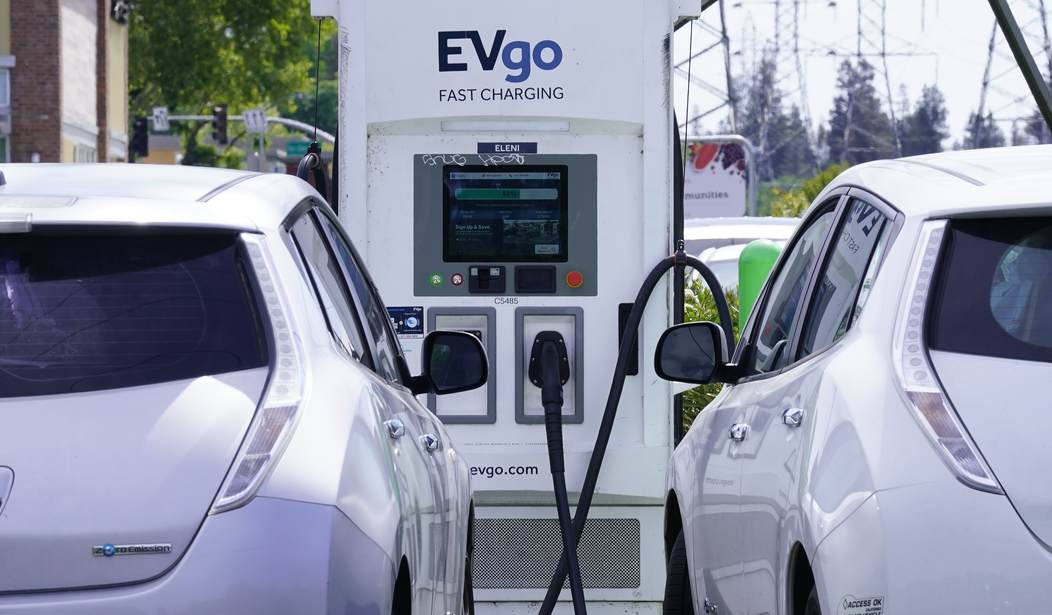Consumer demand for electric vehicles (EVs), unsurprisingly, continues to cool down. Headline after headline confirms this, yet we’re told the transition is happening and we must get on board.
I’m frankly tired of the gaslighting by all actors involved–from the federal government and complicit car companies.
That market demand for EVs they keep telling us about? It’s a total mirage. Let’s not kid ourselves: No large-scale transition from gas-powered cars to EVs is taking place. Nada. Zilch. Even if one million Americans opted for EVs in 2023, many of them are still retaining their gas-powered cars for longer excursions.
Why abandon a reliable mode of transportation for a so-called “clean” alternative that’s been tried before, is more costly, is ethically questionable, and requires multiple charging stops? Americans aren’t buying what the preservationists and climate activists are selling.
The car rental company, Hertz, recently had this realization. Last week, Hertz announced it’s ridding a third of its EV fleet– 20,000 vehicles–and, get this, trading them in for gas-powered cars.
Recommended
If you’ve ever rented from Hertz, you’re familiar with the company’s forceful EV push. This happened to me during a summer 2022 trip to Southern California, where the “cheapest” option first presented to me was a Tesla EV. But I fought back and selected a reliable gas-powered car to get me from Los Angeles to my hometown area, Orange County, for a friend’s wedding. Others I know haven’t been so lucky with the and were forced to go with Chevy Bolts or similar models.
“Hertz Global Holdings, Inc. (the “Company” or “Hertz”) has made the strategic decision to sell approximately 20,000 electric vehicles (“EVs”) from its U.S. fleet, or about one-third of the global EV fleet,” the company said in a Securities and Exchange Commission (SEC) filing last week. “These vehicle dispositions, which were initiated in December 2023 and are expected to take place in an orderly fashion over the course of 2024, will cover multiple makes and models. EVs held for sale will remain eligible for rental within the Company’s fleet during the sales process. The Company expects to reinvest a portion of the proceeds from the sale of EVs into the purchase of internal combustion engine (“ICE”) vehicles to meet customer demand.”
The filing added, “The Company’s decision to reduce its EV fleet will result in the recognition, during the fourth quarter of 2023, of approximately $245 million of incremental net depreciation expense related to the sale. This non-cash charge represents the write down of the EVs’ carrying values as of December 31, 2023 to their fair values, less related expenses associated with the disposition of the vehicles.”
The Hertz case study is one of many pointing to the non-existent market demand for EV adoption.
The chilly reception EVs are getting is not isolated. It’s reality. And this trend could derail the Biden administration’s rule – the Environmental Protection Agency’s tailpipe emissions rules—to force EV adoption on the populace. As I noted at IWF recently:
In April, the Environmental Protection Agency (EPA) announced a rule to mandate that 67% of new vehicle sales in America be electric. The Inflation Reduction Act (IRA) currently offers a $7,500 subsidy to anyone who purchases a new electric vehicle.
This month, the White House announced additional actions to speed up EV adoption across both the public and private sectors. Federal employees, for instance, will be encouraged to seek EV options to “save taxpayer money and reduce pollution that jeopardizes people’s health and fuels the climate crisis.”
2024, unsurprisingly, is already spelling doom for EV adoption. A new S&P Global Mobility report found consumers are now opting-in for hybrid cars and not EVs, noting, “According to return-to-market vehicle registration data, households with gasoline internal-combustion engine vehicles are more likely to migrate to hybrid cars (including both HEVs and PHEVs) than to full battery electric vehicles (BEV). And if Tesla is removed from the equation, other brands' EVs are barely represented in the migration-from-ICE list.”
Last fall, many car manufacturers conceded their EV strategy is a major flop.
Notably, GM and Honda nixed plans to create an “affordable” EV car. Before that, Ford Motor Company revealed it paused a $12 billion investment for making these vehicles. Perhaps the most damning news came when CarGurus reported the 506% increase in EV inventories at car dealerships. Ouch!
This revelation then prompted 3,000 car dealers nationwide to demand the Biden administration immediately pump their brakes on its misguided EV adoption scheme.
But will Biden and company listen this year? I don’t expect to see it. They are double-downing on the failed policy and mandating federal employees “lead by example” by using EVs in their daily lives – including work trips. Action was taken last month to “boost access to electric vehicles (EVs), save taxpayer dollars, and tackle the climate crisis.”
The EV bubble that never was is expected to burst. You can thank the “Inflation Reduction Act” and related executive actions.
No American is tapping into their increasingly scarce financial resources to get a mediocre – and dangerous– $50,000 car.

























